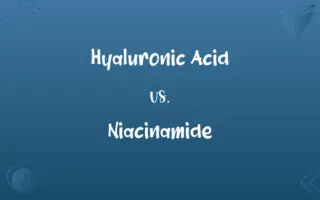ITP vs. TTP: Know the Difference

By Shumaila Saeed || Published on July 8, 2024
ITP (Idiopathic Thrombocytopenic Purpura) is a blood disorder causing low platelet counts, while TTP (Thrombotic Thrombocytopenic Purpura) involves blood clots and platelet consumption.

Key Differences
ITP, or Idiopathic Thrombocytopenic Purpura, is a condition characterized by a low platelet count, leading to easy bruising and bleeding. TTP, or Thrombotic Thrombocytopenic Purpura, is a rarer disorder where blood clots form in small blood vessels throughout the body.
Shumaila Saeed
Jul 08, 2024
The cause of ITP is often unknown, hence 'idiopathic,' and it can occur in both children and adults. TTP, however, is usually caused by a deficiency of an enzyme called ADAMTS13, leading to abnormal blood clotting.
Shumaila Saeed
Jul 08, 2024
Symptoms of ITP include bruising, nosebleeds, and heavy periods, mainly due to the reduced platelet count. TTP symptoms are more severe, including fever, fatigue, neurological changes, and potential kidney damage due to microclots.
Shumaila Saeed
Jul 08, 2024
Treatment for ITP often involves steroids, immune globulins, and sometimes splenectomy. In contrast, TTP requires immediate treatment with plasma exchange and possibly immunosuppressive medications.
Shumaila Saeed
Jul 08, 2024
ITP can be chronic, especially in adults, requiring ongoing management, whereas TTP, though potentially life-threatening, is treatable and can be acute.
Shumaila Saeed
Jul 08, 2024
ADVERTISEMENT
Comparison Chart
Definition
Blood disorder with low platelet count
Disorder causing blood clots and platelet consumption
Shumaila Saeed
Jul 08, 2024
Symptoms
Bruising, nosebleeds, heavy periods
Fever, fatigue, neurological changes, kidney issues
Shumaila Saeed
Jul 08, 2024
Treatment
Steroids, immune globulins, splenectomy
Plasma exchange, immunosuppressive drugs
Shumaila Saeed
Jul 08, 2024
ADVERTISEMENT
ITP and TTP Definitions
ITP
Characterized by immune system attacking platelets.
His ITP resulted in his immune system mistakenly targeting his platelets.
Shumaila Saeed
Jan 16, 2024
TTP
Treated with plasma exchange and immunosuppression.
To treat her TTP, she underwent plasma exchange therapy.
Shumaila Saeed
Jan 16, 2024
ITP
A disorder causing low platelets leading to bleeding and bruising.
After being diagnosed with ITP, she noticed increased bruising.
Shumaila Saeed
Jan 16, 2024
TTP
Can be a medical emergency requiring prompt treatment.
He was rushed to the hospital for immediate TTP treatment.
Shumaila Saeed
Jan 16, 2024
ITP
Can occur spontaneously without a known cause.
She developed ITP suddenly, with no clear reason for its onset.
Shumaila Saeed
Jan 16, 2024
ADVERTISEMENT
TTP
Often caused by a deficiency of the ADAMTS13 enzyme.
Her TTP was linked to low levels of the ADAMTS13 enzyme.
Shumaila Saeed
Jan 16, 2024
ITP
Often managed with medications or sometimes surgery.
To treat his ITP, he was put on a course of steroids.
Shumaila Saeed
Jan 16, 2024
TTP
A blood disorder involving clot formation in small vessels.
He was diagnosed with TTP after experiencing unusual clotting issues.
Shumaila Saeed
Jan 16, 2024
ITP
Can be acute in children and chronic in adults.
Her daughter's ITP resolved quickly, unlike adult cases which can be chronic.
Shumaila Saeed
Jan 16, 2024
TTP
Symptoms include neurological changes and kidney damage.
The patient's TTP presented with confusion and impaired kidney function.
Shumaila Saeed
Jan 16, 2024
Repeatedly Asked Queries
What is the main cause of ITP?
The exact cause of ITP is often unknown but involves the immune system attacking platelets.
Shumaila Saeed
Jul 08, 2024
Can children get ITP?
Yes, children can develop ITP, which often presents as acute and resolves on its own.
Shumaila Saeed
Jul 08, 2024
Is TTP a chronic condition?
TTP can be acute and life-threatening, requiring immediate treatment, but it's not typically chronic.
Shumaila Saeed
Jul 08, 2024
How quickly must TTP be treated?
TTP requires prompt treatment as it can quickly become life-threatening.
Shumaila Saeed
Jul 08, 2024
What are common symptoms of ITP?
Common symptoms of ITP include easy or excessive bruising, bleeding, nosebleeds, and heavy menstrual periods.
Shumaila Saeed
Jul 08, 2024
How is TTP diagnosed?
Diagnosis involves blood tests showing low platelets, hemolytic anemia, and reduced ADAMTS13 enzyme activity.
Shumaila Saeed
Jul 08, 2024
Can TTP be life-threatening?
Yes, without treatment, TTP can be life-threatening due to organ damage from blood clots.
Shumaila Saeed
Jul 08, 2024
How is TTP different from ITP in terms of cause?
TTP is usually caused by a deficiency of the ADAMTS13 enzyme, leading to abnormal blood clot formation.
Shumaila Saeed
Jul 08, 2024
Can TTP recur?
Yes, TTP can recur; ongoing monitoring and maintenance treatment may be necessary.
Shumaila Saeed
Jul 08, 2024
Are the treatments for ITP and TTP similar?
No, the treatments differ significantly. ITP is often treated with steroids and immune globulins, while TTP requires plasma exchange and sometimes immunosuppressive drugs.
Shumaila Saeed
Jul 08, 2024
How is TTP treated?
Treatment typically involves plasma exchange and immunosuppressive medications.
Shumaila Saeed
Jul 08, 2024
Is TTP hereditary?
Some forms of TTP can be hereditary, but acquired forms are more common.
Shumaila Saeed
Jul 08, 2024
Is ITP a life-threatening condition?
ITP can be serious but is usually not life-threatening, especially with appropriate management.
Shumaila Saeed
Jul 08, 2024
Can ITP turn into TTP?
No, ITP and TTP are distinct conditions and one does not transform into the other.
Shumaila Saeed
Jul 08, 2024
Is there a cure for TTP?
While no cure exists, prompt treatment can manage symptoms and prevent complications.
Shumaila Saeed
Jul 08, 2024
Share this page
Link for your blog / website
HTML
Link to share via messenger
About Author
Written by
Shumaila SaeedShumaila Saeed, an expert content creator with 6 years of experience, specializes in distilling complex topics into easily digestible comparisons, shining a light on the nuances that both inform and educate readers with clarity and accuracy.









































































